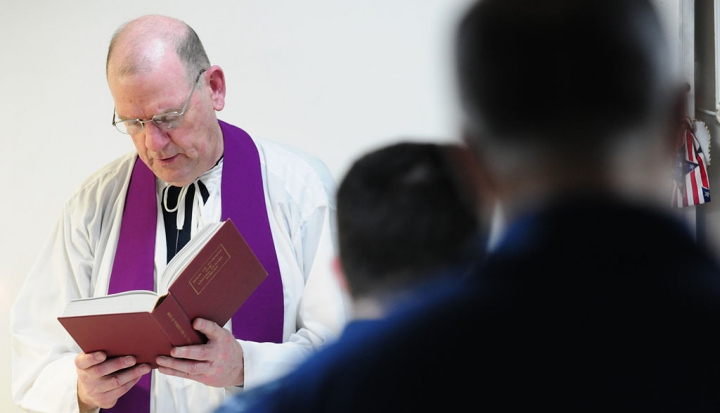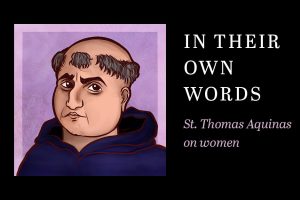In our pampered society, Christianity is not an easy sell. Try offering today’s Christians honor, responsibility, generosity, forgiveness. Try offering forgiveness to kids who’ve been told, even in Catholic schools, guilt trips are bad for you. Try offering resurrection as a value to people who don’t believe they will ever die.
This God we offer willing servitude doesn’t play fair. How do we defend him next to the coffin of a teenage suicide, or the bedside of a young father dying of cancer, or a girl unexpectedly pregnant?
It’s easier to sell Catholicism to an animist aborigine in the Australian outback than to a modern American, even a baptized one, even an educated one. Especially an educated one.
Parish priests are the one religious contact for most Catholics, font to graveside, at pulpit and altar. If their sermons are lackluster, their performance robotic, “the church” is boring. If they’re wooden, moody, brusque, “the church” is uncaring.
When congresswoman and journalist Clare Boothe Luce considered becoming Catholic in the 1940s, she looked at Catholics and wondered, “You claim you have the truth. Well, the truth should set you free, give you joy. Can I see your freedom? Can I feel your joy?”
Can people see priests’ freedom? Do they sense reassuring loyalty to the hierarchy but not numb-brained acquiescence? Do they realize priests must at times yield to the law—but also at times must yield to mercy, human compassion, and common sense?
Can people feel priests’ joy? The root of “religion” is re-ligare, “to bind fast”—a person-to-Person connection with the living God. Do priests help to foster that connection? Do people leave liturgies more energized with the exuberant God-life unleashed the first Easter?
The church’s mission is now to ignite life—and passion—in besotted timber. The priest can no longer act the complacent repository of the sacred in a believing world. He is now a missionary, a subversive in a pagan country that can’t comprehend what he values and, from what little they grasp, want no part of it, except weddings and funerals.
When I wrote applying to the Jesuits, I said I wanted to be a priest “to save my soul and the souls of others.” In my naiveté, I wanted to save souls from some future fiery pit. How many people today value the soul? Do people understand—in their gut—that through human nature God invites us to evolve those souls beyond our undisputed animal natures, ceaselessly learning more and loving more? Now, I want to make them understand they don’t have souls, like an appendix, but that the soul is everything each one is as a unique person. I want to save souls from dying without knowing what life was for.
The symbol that distills “Christian” is a crucifix, a corpse on a gibbet. Christians look at it and say, “There is the most perfectly fulfilled human being who ever lived, caught in his greatest triumph. I want to be like him.”
But apparently in the mind of God, as the crucifix is meant to recall, lasting freedom and joy come only at the price of suffering—which is of its nature opprobrious and therefore repellent.
Yet suffering is inevitable. Our whole lives are suffering, at least in giving up what we’d become accustomed to, on the risk of finding better. Even getting up in the morning is suffering, leaving the warm womb of blankets.
Being a priest is suffering, too.
Priests did, in fact, impose on themselves whatever suffering the priesthood entails when they accepted ordination. Yet, as a couple marrying knows only “more or less” what lies ahead, no priest had a focused idea at the seminary door of what exactly he was assuming. Now every priest knows immeasurably more what “priest” means than when the bishop imposed hands.
It means “passion,” not only passive endurance, but “passion” in the active sense of facing challenges fiercely, with the same ardor a priest first felt when he gave himself over to God.
For priests, celibacy and its twin, loneliness, are root problems. To people flummoxed by the oxymoron “happy celibate,” I say, “If I had a family, they’d deserve my best loving. But four or five isn’t enough. So I keep my love unfocused. Whoever comes along gets my best loving.” Celibacy gives me fewer excuses to say no.
At first, the greatest cost was, to be honest, sex–telling my body I decided what I really wanted that it didn’t tell me. That message helps, provided people see that priests haven’t suppressed or denied sexuality and passion.
The second sacrifice: I’ll never have a child. “Oh, but you’ve had so many spiritual children.” Just isn’t the same, is it? It’s a freely chosen suffering, because I believe God wants something more open-ended from me instead.
Most tellingly: No other human being shares my life. No one loses sleep over me, says I’m working too hard, becoming a pain. So a spiritual director is essential—someone to whom a priest is as transparently self-revealing as to his wife. Someone he’s unafraid to tell, “I’m so devastatingly lonely.”
Would we have had our suffering brothers who abused children, if they’d felt free to expose their souls unreservedly to just one other human being? A priest also needs to be alone with God, to recreate that person-to-Person connection, which is the religion he embodies. And like the sacrament of sex, the Eucharist is a priest’s renewal of his life-pledge. My conviction is the vocation crisis would reverse if more priests made their suffering give birth to freedom and joy.
Most adults are educated and Catholic, but not educated Catholics. Maybe priests’ sufferings in a scornful world would diminish if they stopped treating people they serve as formed Christians and instead as human beings, suffused in paganism, who by their very nature crave more than mere survival.
Maybe we priests would find more satisfaction in our work if we lowered expectations and considered what we know are the true needs of our people rather than confining ourselves to what those above us tell us ought to be their needs.
Then, just maybe, Christianity might have a chance.
Image: Wikimedia















Add comment